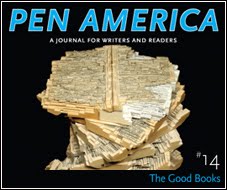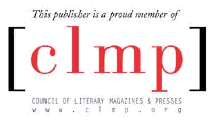
While putting together
PEN America 8: Making Histories, we thought
a lot about the way writers engage with historical fact. The smartest writers
seemed to agree that narrative was never strictly factual-- that fiction creeps into any kind of storytelling. Maggie Nelson, for example, in her beautiful and brilliant memoir/book-of-poems
Jane,
confesses, “I don’t know what to say,” when asked by her father if the book will be “a figment of your imagination.”
A
now-scuttled book that had been planned for early next year brought these matters back to mind over the holiday: Herman Rosenblat’s Holocaust memoir,
Angel at the Fence: The True Story of a Love That Survived, was cancelled by Berkley Books after
Gabriel Sherman reported serious doubts about its veracity in
The New Republic. In the memoir, Rosenblat told the story-- as he has many times before, on television and elsewhere-- of “his reunion with and marriage to the girl he says helped him survive the Holocaust by bringing him apples through the fence of Schlieben, a subdivision of the Buchenwald concentration camp.”
In the commentary that followed, one of the more striking responses came from Professor Ken Waltzer, director of Michigan State University’s Jewish Studies program, who found the episode saddening in many ways, not least because of the picture Rosenblat’s story paints of the Holocaust. “Holocaust experience is not heartwarming, it is heart-rending,”
Waltzer writes.
That comment reminded me of Anya Ulinich’s story “
The Nurse and the Novelist,” from
PEN America 9: Checkpoints. As Anya
told Maud Newton recently, the story satirizes “atrocity kitsch fiction”:
What’s appealing about atrocity kitsch is that there is always a strong hero. There is also a record keeper, a paper trail, an old love letter, an old key, what have you. At the end of the story, somebody becomes stronger…. The nurse character is a curmudgeon and a nut, and her grandmother’s history is a fine example of what happens to ordinary people come times of atrocity. The weak scramble to survive when they’re in a pickle. Their weaknesses come to the fore, betrayal goes unpunished, people would rather forget, ordinary life continues in utilitarian apartments.
I suspect that Anya has a kindred spirit in Aleksandar Hemon (whose
conversation with Rabih Alameddine also appears in
Checkpoints), judging from his most recent book,
The Lazarus Project-- which addresses, in a similarly merciless fashion, more recent atrocities: the war in Bosnia, the torture at Abu Grhaib, human trafficking in Moldova. Hemon interweaves the narrator’s experiences with and reflections on these events with a fictional account of Lazarus Averbuch,
a historical figure, and the victim of
his own personal atrocity. Thinking of
The Lazarus Project again (with some help from
Anne Yoder’s post yesterday at The Millions), a point of contact appears between the purveyors of false memoirs and atrocity kitsch, respectively. Both groups of writers exploit the wishes of many readers to see redemption in the worst the world has to offer, rather than merely facing it for what it is. This is, perhaps, its own kind of lie, the kind that has nothing to do with historical fact.
 While putting together PEN America 8: Making Histories, we thought a lot about the way writers engage with historical fact. The smartest writers seemed to agree that narrative was never strictly factual-- that fiction creeps into any kind of storytelling. Maggie Nelson, for example, in her beautiful and brilliant memoir/book-of-poems Jane, confesses, “I don’t know what to say,” when asked by her father if the book will be “a figment of your imagination.”
While putting together PEN America 8: Making Histories, we thought a lot about the way writers engage with historical fact. The smartest writers seemed to agree that narrative was never strictly factual-- that fiction creeps into any kind of storytelling. Maggie Nelson, for example, in her beautiful and brilliant memoir/book-of-poems Jane, confesses, “I don’t know what to say,” when asked by her father if the book will be “a figment of your imagination.”


